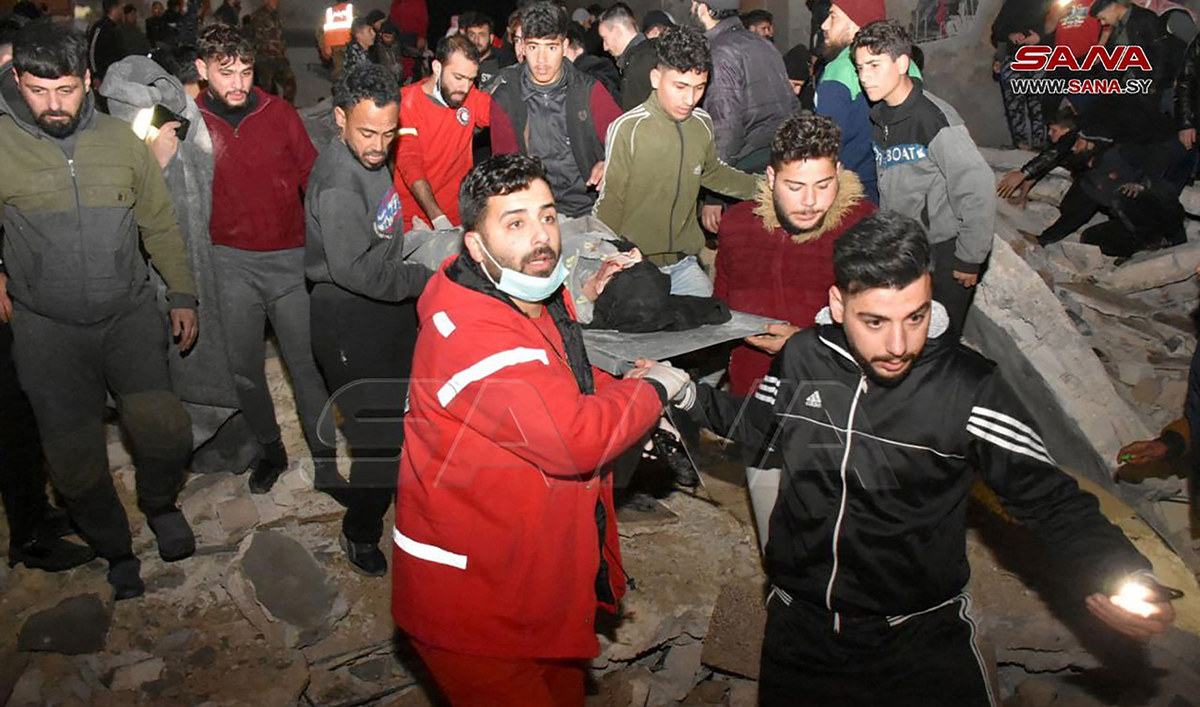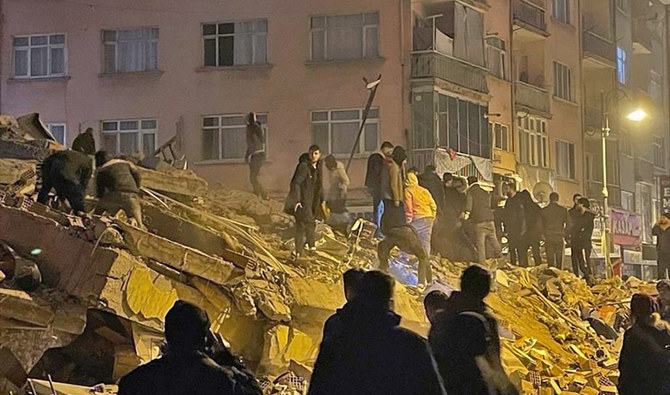ANKARA: A second earthquake measuring at least 7.5 magnitude rocked Turkiyer and neighboring Syria less than 12 hours after the border areas were hit by a quake measuring 7.8, killing more than 1,000 people, with many others missing or injuredon Monday morning.
The 7.8-magnitude quake struck just after 4 a.m. local time on Monday, 23 kilometerseast of Nurdagi, Gaziantep province, at a depth of 24.1 kilometers, according to data from the United States Geological Survey.
The second quake struck at 1:45p.m. local time - the impact to the death toll as of yet still unknown.
Tremors from aftershocks continued throughout the day and were felt as far as Beirut in Lebanon and in Iraq's Duhok and Erbil.
It is not clear precisely how many people have died, although President Recep Tayyip Erdogan said the current number of dead in Turkiye was more than 900, but added it woukld not be possible to predict what the final death toll might be.
Meanwhile in Syria the number was placed at 710 dead according to the Syrian Observatory for Human Rights.
The 7.8-magnitude quake struck just after 4 a.m. local time on Monday, 23 kilometerseast of Nurdagi, Gaziantep province, at a depth of 24.1 kilometers, according to data from the United States Geological Survey.
The earthquake caused devastation across both sides of the Turkish-Syrian border claiming hundreds of lives.
The quake was so strong that tremors were felt in Lebanon, Jordan, Israel and Egypt.
A hospital in the southeastern Sanliurfa province was completely destroyed by the earthquake, with many patients remaining trapped beneath the rubble.
Rescue workers and residents frantically searched for survivors under the rubble of collapsed buildings in various cities on both sides of the border. In one quake-struck Turkish city, people frantically pulled away chunks of concrete and twisted metal. People on the street shouted up to others inside a partially toppled apartment building, leaning dangerously.
In the Turkish city of Adana, one resident said three buildings near his home collapsed. “I don’t have the strength anymore,” one survivor could be heard calling out from beneath the rubble, as rescue workers tried to reach him, said Muhammet Fatih Yavus a resident. Further east in Diyarbakir, cranes and rescue teams rushed people on stretchers out of a mountain of pancaked concrete floors that was once an apartment building.
At least 20 aftershocks followed, some hours later, the strongest measuring 6.6, Turkish authorities said.
Buildings toppled to the ground in Syria’s cities of Aleppo and Hama to Turkiye’s Diyarbakir, more than 330 kilometers to the northeast.
Also in Syria, the quake smashed opposition-held regions that are packed with some 4 million people displaced from other parts of Syria by the country’s long civil war. Many of them were already living in destitute conditions with little health care, with Russian-backed Syrian forces surrounding the area and sometimes carrying out airstrikes. Rescue workers said hospitals in the area were packed.
“We fear that the deaths are in the hundreds,” Muheeb Qaddour, a doctor, said by phone from the town of Atmeh, referring to the entire rebel-held area. Raed Salah, the head of the White Helmets, the emergency organization in opposition areas, said whole neighborhoods were collapsed in some areas.
The quake, felt as far away as Cairo, was centered north of the city of Gaziantep in an area about 90 kilometers from the Syrian border.
On the Turkish side, the area has several large cities and is home to millions of Syrian refugees.

In this handout photo taken by Sana news aganecy in Hama, Syria on February 6, 2023, rescuers evacuate a victim from an eight-storey building that collapsed after an 7.8-magnitude earthquake in southern Turkey. (Photo courtesy: SANA/AFP)
Turkish President Recep Tayyip Erdogan said on Twitter that “search and rescue teams were immediately dispatched” to the areas hit by the quake.
“We hope that we will get through this disaster together as soon as possible and with the least damage,” he wrote.
Interior Minister Suleyman Soylu urged people not to enter damaged buildings due to the risks. “Our priority is to bring out people trapped under ruined buildings and to transfer them to hospitals,” he said.
At least 130 buildings tumbled down in Turkiye’s Malatya province, neighboring the epicenter, Gov. Hulusi Sahin said. In the Turkish city of Diyarbakir, at least 15 buildings collapsed. Rescue teams called for silence as they listed for survivors in a toppled 11-story building.
In northwest Syria, the opposition’s Syrian Civil Defense described the situation in the rebel-held region as “disastrous” adding that entire buildings have collapsed and people are trapped under the rubble. The civil defense urged people to evacuate buildings to gather in open areas. Emergency rooms were full of injured, said Amjad Rass, president of the Syrian American Medical Society.
US President Biden directed USAID and other federal government partners to assess response options to the most affected areas in the Turkiye and Syria earthquake, National Security Advisor Jake Sullivan said in a statement on Sunday.
The United States is profoundly concerned by the reports of the destructive earthquake, he said.
The US Geological Survey said the quake was centered about 33 kilometers from Gaziantep, a major city and provincial capital. It was centered 18 kilometers deep, and a strong 6.7 aftershock rumbled about 10 minutes later.
Syria’s state media reported that some buildings collapsed in the northern city of Aleppo and the central city of Hama.
In Damascus, buildings shook and many people went down to the streets in fear.
The quake jolted residents in Lebanon from beds, shaking buildings for about 40 seconds. Many residents of Beirut left their homes and took to the streets or drove in their cars away from buildings.
The earthquake came as the Middle East is experiencing a snowstorm that is expected to continue until Thursday.
Turkiye sits on top of major fault lines and is frequently shaken by earthquakes.
Some 18,000 were killed in powerful earthquakes that hit northwest Turkiye in 1999.
The earthquake came as the Middle East is experiencing a snowstorm that is expected to continue until Thursday.
Cetizens from as far as Jerusalem and Beirut talked of being awakened by the strong shaking. "I live in Gaziantep, Türkiye. Was sleeping when it started. Absolutely terrifying," Nasip (@iam_nasib) commented on a video posted on Twitter.
"Felt it in Jerusalem," said Amy di Nardò (@amybellabella).
Sagittarius (@JRsagittarius) said he was in Beirut and the experienced "was terrifying."
Karolingston (@karolingston) of Cyprus said he was awakened because "My bed was shaking."
"Felt it in Lebanon. It was a hell of a feeling!" chimed in CharbelRahmé (@charbelrahm_e)
Turkiye is in one of the world’s most active earthquake zones.
Duzce was one of the regions hit by a 7.4-magnitude earthquake in 1999 — the worst to hit Turkiye in decades.
That quake killed more than 17,000 people, including about 1,000 in Istanbul.
Experts have long warned a large quake could devastate Istanbul, which has allowed widespread building without safety precautions.
A magnitude-6.8 quake hit Elazig in January 2020, killing more than 40 people.
And in October that year, a magnitude-7.0 quake hit the Aegean Sea, killing 114 people and wounding more than 1,000.
(With agencies)




















